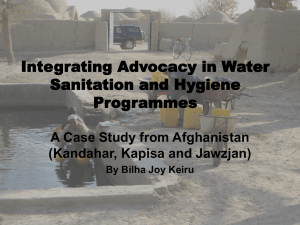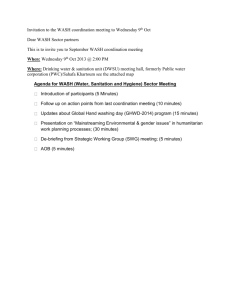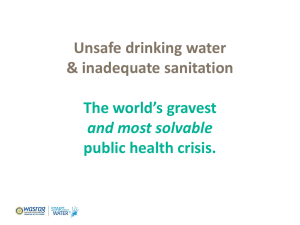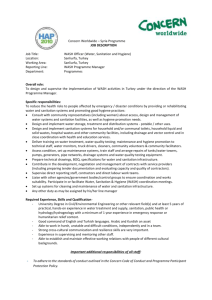WHY ADVOCATE FOR WATER, SANITATION AND HYGIENE?
advertisement
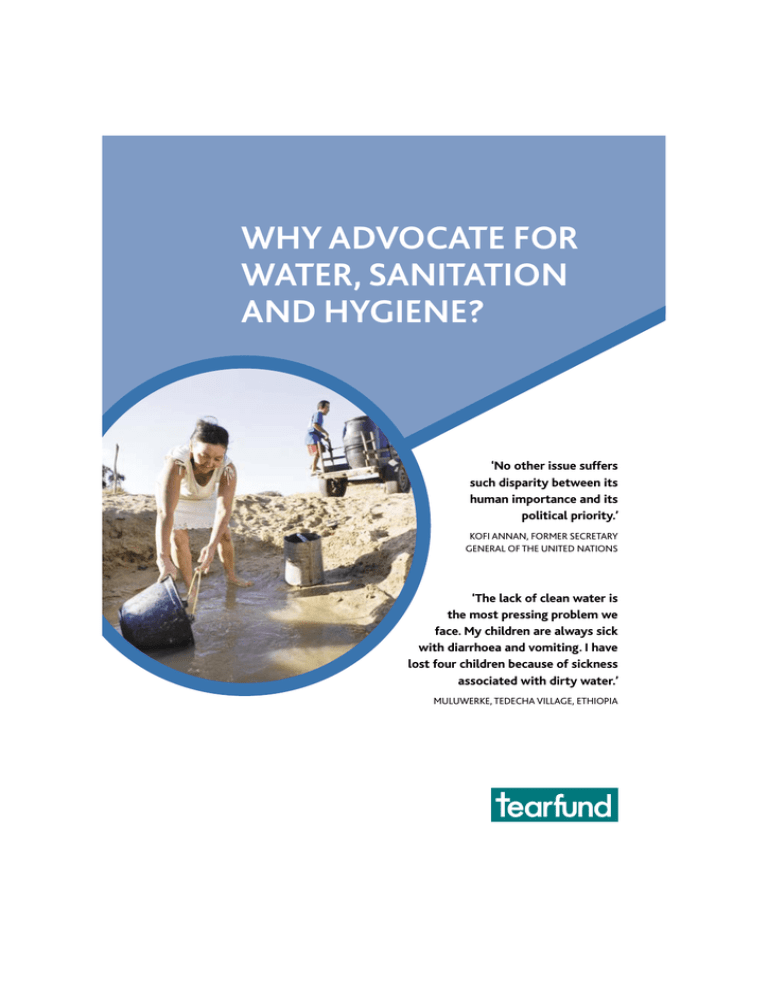
WHY ADVOCATE FOR WATER, SANITATION AND HYGIENE? ‘No other issue suffers such disparity between its human importance and its political priority.’ KOFI ANNAN, FORMER SECRETARY GENERAL OF THE UNITED NATIONS ‘The lack of clean water is the most pressing problem we face. My children are always sick with diarrhoea and vomiting. I have lost four children because of sickness associated with dirty water.’ MULUWERKE, TEDECHA VILLAGE, ETHIOPIA Why advocate for water, sanitation and hygiene? Author: Sue Yardley (based on the first edition by Joanne Green) Thanks to the following for their comments: Mari Williams, Jane Cacouris, Tom Baker, Frank Greaves and Joanna Watson Cover photos: Marcus Perkins / Tearfund and Layton Thompson / Tearfund Illustrations: Bill Crooks / Gamos, Rod Mill / Sancton Drawing Services Design: Wingfinger © Tearfund 2005, Second edition © Tearfund 2009 Tearfund is a Christian relief and development agency building a global network of local churches to help eradicate poverty. Tearfund, 100 Church Road, Teddington, TW11 8QE, UK For further information contact ppadministrator@tearfund.org 2 Why advocate for water, sanitation and hygiene? Contents Introduction 4 What is advocacy? 4 The global problem 5 Water, sanitation and hygiene are fundamental to human development 7 Governments are responsible 8 The role of civil society 9 The role of the church 10 Governments and civil society must work together 11 Next steps 12 Useful networks and organisations 13 Further reading and references 13 © TEARFUND 2009 3 W H Y A DVO C AT E F O R WAT E R , S A N I TAT I O N A N D H YG I E N E ? Introduction This booklet is for organisations that are engaged in water, sanitation and hygiene (WASH) programme work but not yet carrying out advocacy on these matters. It will help show how an advocacy approach can complement programmatic work in addressing the issue of WASH. In this short guide we look at what advocacy is, the global WASH problem, how water and sanitation is fundamental to human development, the role of governments, civil society and churches, and why advocacy is necessary. The aim of this booklet is to inspire organisations to integrate advocacy into their water, sanitation and hygiene work, in order to bring long-term sustainable and positive change. What is advocacy? Advocacy is about influencing people, policies, structures and systems in order to bring about change. It is about influencing those in power to act more fairly. Tearfund defines advocacy as... ‘seeking with, and on behalf of, poor people to address the underlying causes of poverty, bring justice and support good development through influencing the policies and practices of the powerful’. Advocacy is firmly rooted in the Bible, and is based on God’s commitment to justice: ‘Speak up for those who cannot speak for themselves, for the rights of all who are destitute. Speak up and judge fairly; defend the rights of the poor and needy.’ PROVERBS 31:8-9 Advocacy complements other approaches to development because it: — tackles root causes of poverty and injustice and brings long-term change — sees people as agents of change in their own communities — can change power structures, unjust practices and systems of injustice — can help to generate more resources for other development work. Decision makers, such as governments and local leaders, are often aware that there is a problem and will welcome suggestions about how it can be solved. The role of an advocate includes facilitating communication between people, negotiating, 4 © TEARFUND 2009 W H Y A DVO C AT E F O R WAT E R , S A N I TAT I O N A N D H YG I E N E ? mediating, accompanying, empowering, demonstrating good practice and building alliances. Advocacy can involve a number of activities, including research, lobbying, campaigning, prayer, networking, awareness-raising and media work.1 The global problem For many years, community-based organisations (CBOs), including churches, and non-governmental organisations (NGOs) have been working with poor communities to provide access to water and sanitation and promote safe hygiene. In the year 2000, all UN member states signed up to the Millennium Development Goals (MDGs) to halve world poverty by 2015. Goal 7, target 10, aims to ‘halve, by 2015, the proportion of people without sustainable access to safe drinking water and basic sanitation’. Progress against this MDG target, however, is poor. At current rates, in sub-Saharan Africa the water target will not be met until 2035, while the sanitation target will not be met until the 22nd century. ■ Globally, 2.5 billion people lack access to basic sanitation and 900 million people lack access to safe drinking water.2 ■ Every day, at least 5,000 children die of preventable diseases related to unclean water and poor sanitation.3 At Tearfund, we are calling on world leaders to give much more political priority to WASH, to spend more money on WASH, and to spend it more effectively, particularly in the countries most off-track in terms of their progress towards meeting the MDG target. We are also advocating for developing country governments to listen to the needs and priorities of poor people (especially women) 4 and strengthen the political will and financing necessary to meet the MDG target. We are slowly making progress, but there is still a lot to be done. 1 For further information about effective advocacy work, see Tearfund’s ROOTS 1 and 2, Advocacy Toolkit. 2 Unicef and WHO (2008) 3 Unicef and WHO (2008) state that 4,000 children die each day from diarrhoea; but poor sanitation is also linked to many other causes of infant death, such as pneumonia, neonatal disorders and undernutrition, trachoma and worm-related illnesses, bringing the conservative estimate to a total of 5,000. 4 Women are particularly affected by poor water and sanitation facilities, as they are often responsible for managing their households, collecting water, cleaning, and looking after family members who are sick. © TEARFUND 2009 5 W H Y A DVO C AT E F O R WAT E R , S A N I TAT I O N A N D H YG I E N E ? Tearfund is working as part of a global civil society coalition called End Water Poverty, which is working for an end to the water and sanitation crisis highlighted above. One of the main things the coalition is calling for is a Global Framework for Action for water and sanitation. This framework would provide an agreement in which: — GOVERNMENTS IN DEVELOPING COUNTRIES create national plans to provide sanitation and water for all, and invest more in their implementation — GOVERNMENTS IN DONOR COUNTRIES support the development of these plans, and ensure that no national plan fails for lack of finance — INTERNATIONAL SYSTEMS are developed to monitor and drive progress in the sector, including a global task force, an annual review and an annual global highlevel meeting. Tearfund is working towards these aims at an international and national level. However, our North-facing advocacy isn’t enough. This guide outlines why further advocacy work is needed by Tearfund partners in their own countries. In particular, it looks at five issues: ■ The provision of adequate WASH services is fundamental to human development. ■ Governments are responsible for providing adequate WASH services and should be held accountable. ■ Civil society can help ensure the needs of poor people are met. ■ The church is a vital part of civil society and has a specific role to play. ■ Governments, civil society and the church must work together to bring about lasting improvements in WASH. Finally, we look briefly at how to begin advocacy work on WASH and provide recommendations on further resources and contacts. ‘Overcoming the crisis in water and sanitation is one of the great human development challenges of the early 21st century.’ HUMAN DEVELOPMENT REPORT, 2006 6 © TEARFUND 2009 W H Y A DVO C AT E F O R WAT E R , S A N I TAT I O N A N D H YG I E N E ? Water, sanitation and hygiene are fundamental to human development The provision of clean water and basic sanitation underpins all areas of sustainable human development. They are essential necessities for life, and access to them is a basic human right. Their lack causes poverty and suffering. Governments need to ensure that this right is realised by taking measures towards enabling the whole population to access clean water, sanitation and safe hygiene promotion. Governments will not be able to reduce poverty and make progress in other areas such as health, education, gender equity and economic growth unless WASH issues are addressed: ■ Over half the hospital beds in developing countries are filled with people suffering from water-related diseases.5 ■ Some 443 million school days are missed each year because of sickness from diarrhoeal diseases. It is estimated that half of the girls who stop attending primary school in Africa do so because of the lack of toilets.6 ■ For every $1 spent on water and sanitation, $8 is gained in terms of saved time, increased productivity and reduced health costs.7 ■ For millions of women, inadequate access to sanitation is a source of shame, physical discomfort and insecurity. Many women are only able to defecate at night, when they are vulnerable to physical assault. ‘One tenth of the global disease burden is preventable by achievable improvements in the way we manage water... Water-related improvements are crucial to meet the Millennium Development Goals, reduce child mortality, and improve health and nutritional status in a sustainable way.’ DR MARIA NEIRA, DIRECTOR OF PUBLIC HEALTH AND ENVIRONMENT, WORLD HEALTH ORGANISATION 8 5 UNDP (2006) p45 6 Ibid 7 Ibid p58 8 Prüss-Üstün et al (2008) p7 © TEARFUND 2009 7 W H Y A DVO C AT E F O R WAT E R , S A N I TAT I O N A N D H YG I E N E ? Governments are responsible As noted in the previous section, it is the responsibility of governments to ensure that people have access to adequate WASH services. Governments (local and national) therefore need to be held to account for the global WASH problem. Poor governance is one of the main reasons why people lack access to water and sanitation. Poor governance is the term used to describe the situation when a government is not effective, open and transparent, or accountable to its citizens. ‘Government leadership in creating the conditions for progress in sanitation is vital … Communities or NGOs acting alone can create islands of success, sometimes on an impressive scale. But project-led advances cannot substitute for the financial, political and administrative resources that governments can bring to bear.’ UNITED NATIONS DEVELOPMENT PROGRAMME 9 Many governments do not recognise or understand how improvements in WASH underpin progress in other development areas. In their national poverty reduction plans, most governments are not prioritising WASH activities or allocating sufficient funding for key infrastructure, programmes and staff who can manage and regulate the sector. The failure by governments to meet the WASH needs of their population is resulting in an increased burden on poor people and communities. A review of 12 poverty reduction strategy papers found that despite water and sanitation often being in the top three or four priorities in participatory poverty assessments, the sector did not receive as much attention as health and education. The study recognised the importance of developing effective advocacy tools to ‘build and sustain commitment to the sector within poverty reduction strategies’ and the important role of civil society in this process. Water and Sanitation Programme (2003) p3 9 8 UNDP (2006) pp125–126 © TEARFUND 2009 W H Y A DVO C AT E F O R WAT E R , S A N I TAT I O N A N D H YG I E N E ? The role of civil society CBOs, NGOs and churches are all key parts of civil society. When a government is forming policies, it should ensure they are based on real experience, knowledge of what works, and the needs of the community. Governments should consult their citizens on policy decisions, and civil society has a wealth of experience and expertise in working with communities on WASH issues that should be shared. Civil society can work with poor people to get their voices heard by those in power. This can be done by speaking on behalf of communities, speaking with those affected or empowering representatives to speak for themselves. Civil society has a role in holding governments to account for the promises they have made and their failure to ensure these services are provided. Similarly, civil society should congratulate governments when appropriate, for example if they respond to public pressure or honour their promises and commitments. By advocating on WASH issues, civil society can push governments to be more transparent and participatory in their decision-making. This is important for communities, as it will help them to find out what governments have said they will deliver, and therefore the points on which they can hold governments to account. CASE STUDY Tearfund partner representing civil society Addise Amado, Community Empowerment and Capacity Building Coordinator for a Tearfund partner in Ethiopia, has been a civil society representative at EU meetings on WASH called the EU Water Initiative. Addise reflects on the impact his presence has had at these meetings: ‘This meant a lot for my dignitaries, as I was both a witness to discussions and eventually became part of a country-wide decision-making forum on WASH. These processes allowed me to learn what it means to be represented and heard, and to air the voices of the poor and civil society organisations (CSOs).’ Addise has since become part of various national WASH decision-making bodies as well as voicing opinions of southern CSOs at international meetings. © TEARFUND 2009 9 W H Y A DVO C AT E F O R WAT E R , S A N I TAT I O N A N D H YG I E N E ? The role of the church For more than 40 years Tearfund has been building a global network of churches to engage in relief, development and advocacy work. Tearfund believes that Christian organisations (for example church denominations, development departments of denominations, Christian networks, Bible colleges or Christian NGOs) can work with the local church to bring about community transformation and therefore have a unique role to play as a key part of civil society.11 The local church forms part of many communities around the world, and its leaders and members see and experience poverty and injustice at first hand. Christian organisations can help the local church make the most of being in this strategic and timely position to enable communities to speak for themselves, or advocate on behalf of, or with, those without adequate WASH facilities. Churches can: — garner a deep understanding of local issues — build relationships based on trust within the communities where they are found — be permanently based in a community — make use of their coordinating body to gain the credibility, respect and authority needed to affect local, national, regional and international policy processes. CASE STUDY Successful church-based advocacy Tearfund partner Fale is a national advocacy network founded in 2001 in Brazil which seeks to mobilise churches and Christians to speak out and act on issues of poverty and injustice both within the country and globally. Since 2006, Fale has been campaigning to get national policy makers to give greater political priority to this issue. In December 2006, Fale began campaigning for environmental sanitation in Brazil, where around 43 million people lack access to improved sanitation, calling for a law to create a National Policy for Environmental Sanitation. In January 2008 the Brazilian government approved a law establishing national guidelines for public policy on this issue. As a result of this, many Brazilians will hopefully benefit from better government policies on sanitation. Being an advocate for change in WASH policy may incorporate demonstrating evidence of successful programmatic intervention, and can therefore complement the wider work Christian organisations are doing. It is also worth considering partnering with other organisations in civil society which bring different expertise in community mobilisation, WASH or advocacy. 11 10 For further information on the role of the local church, see Tearfund’s ROOTS 11, Partnering with the Local Church. © TEARFUND 2009 W H Y A DVO C AT E F O R WAT E R , S A N I TAT I O N A N D H YG I E N E ? Governments and civil society must work together All stakeholders, including government and civil society, need to work together if goals and targets are to be reached. The policies governments set can affect the work of civil society, and the communities they serve, in both negative and positive ways. It is therefore important for governments to involve civil society in decisionmaking so that the needs of poor people can be better represented. Importantly, the work of civil society must not allow the government to give up its responsibility for meeting the WASH needs of its population. In terms of implementation, civil society can make a significant contribution to the provision of WASH services, but it does not have the scale of financial or human resources required for everyone to have access to WASH. Without the involvement of government, most water supplies and behavioural change will not be sustainable, because of the often short-term nature of civil society project work. Furthermore, duplication of work can be avoided if civil society and governments work together. In order for Christian organisations to work more closely with both governments and donors, they have a responsibility to break down misconceptions and to demonstrate and communicate their distinctive strengths, achievements and comparative advantage. CASE STUDY Building good links with government The Kigezi Diocese Water and Sanitation Programme (KDWSP), a Tearfund partner in Uganda, has recognised the importance of working closely with local government. While implementing effective work on improving access to WASH, KDWSP has forged strong links with local government and is also well known to central government. This puts it in a strong position to advocate for changes to policy and practice nationally and internationally. Carter RC and Rwamwanja R (2006) © TEARFUND 2009 11 W H Y A DVO C AT E F O R WAT E R , S A N I TAT I O N A N D H YG I E N E ? Next steps Before deciding whether to develop an advocacy strategy, you can find out more about what advocacy involves by reading Tearfund’s Advocacy Toolkit (ROOTS 1 and 2). This will give you further information on why advocacy is important and practical ways to carry it out. It is important to consider whether you have the organisational capacity and support required for advocacy work. When applying for funding, consider including provision for advocacy to help fund an advocacy post, build advocacy capacity or develop advocacy work. You need to make sure that advocacy work is integrated into your planning processes and ongoing development work, so that it is relevant to the rest of your work and has an allocated budget. It is also important to make sure you are not doing anything that contradicts what you are asking others to do. It is good to try to work in partnership. Find out which other organisations are working on the same issues as you. Could you work together to influence decisions? Are there any national coalitions doing WASH advocacy work that you could join? If you decide to go ahead with advocacy work on WASH, the following questions might help to analyse the issue: — Who benefits from water, sanitation and hygiene promotion, who does not, and what additional burdens are placed on those who do not benefit? — Why do they not benefit? Is it because of prejudice at community level, or a legal or governance issue? To find this out, you may need to do some research by asking other organisations, research institutions or universities, or by requesting information from a government department. — How much do WASH services cost and how much do users pay? How much do those who do not benefit pay for the service? Who should pay? — Who has the government given responsibility to for delivering water services? Is it local government, national government or other providers? You may need to do some research on this and find out which government ministry or ministries are responsible for water. — Who has the government given responsibility to for sanitation? It may be spread across a number of ministries. Is there a clear lead and are these ministries coordinating? — What is the government’s policy or strategy for delivering WASH? — How are decisions made about WASH policy and practice, and who makes them? — What monitoring systems are in place to make sure the government does what it says? — What area can you focus on that best uses your existing knowledge and experience? How could advocacy be used as an approach that complements the programmatic WASH work you are already doing? If there is a clear advocacy angle, this might be the best place to start. 12 © TEARFUND 2009 W H Y A DVO C AT E F O R WAT E R , S A N I TAT I O N A N D H YG I E N E ? Useful networks and organisations Global End Water Poverty Freshwater Action Network (FAN) An international campaign calling for sanitation and water for all, that you could consider joining. A useful network of civil society organisations seeking to influence policy at international and national levels. See below for details of networks in your region. 2nd Floor, 47–49 Durham Street London SE11 5JD UK Telephone: +44 20 7793 4522 Email: fan@freshwateraction.net Website: www.freshwateraction.net Water Supply and Sanitation Collaborative Council (WSSCC) Plays a key role in national campaigns: use their website to find out what they might be doing in your country. International Environment House 9 Chemin des Anémones 1219 Châtelaine Geneva Switzerland Telephone: +41 22 917 8657 Email: wsscc@who.int Website: www.wsscc.org c/o Water Aid 47–49 Durham Street London SE11 5JD UK Telephone: +44 20 7793 4500 Email: info@endwaterpoverty.org Website: www.endwaterpoverty.org Regional You can find out up-to-date contact details of the following Freshwater Action Networks at the international website given above: FANCA – Central America FAN-Mex – Mexico FANAS – South America ANEW – Africa FANSA – South Asia National There are many national networks doing advocacy on water issues. Find out about national networks by asking other NGOs working on WASH issues or your Tearfund country representative. Further reading and references ■ Carter RC and Rwamwanja R (2006) Functional sustainability in community water and sanitation, Tearfund, UK ■ Commission for Africa (2005) Our Common Interest ■ Prüss-Üstün A et al (2008) Safer water, better health: Costs, benefits and sustainability of interventions to protect and promote health, WHO, Geneva ■ Tearfund (2009) Keeping Communities Clean: the church’s response to sanitation and hygiene, Tearfund, UK ■ Tearfund ROOTS 1 and 2, Advocacy Toolkit, Tearfund, UK © TEARFUND 2009 13 W H Y A DVO C AT E F O R WAT E R , S A N I TAT I O N A N D H YG I E N E ? ■ Tearfund ROOTS 11, Partnering with the local church, Tearfund, UK ■ UNDP Human Development Report (2006) Beyond Scarcity: Power, poverty and the global water crisis, UNDP, New York ■ Unicef and WHO Joint Monitoring Programme for Water Supply and Sanitation (2008) Progress on drinking water and sanitation: Special focus on sanitation, Unicef, New York, and WHO, Geneva ■ Water and Sanitation Programme (2003) Water supply and sanitation in poverty reduction strategy papers in sub-Saharan Africa: Developing a benchmarking review and exploring the way forward, World Bank, Nairobi ■ Water as a human right: www2.ohchr.org/english/issues/water 14 © TEARFUND 2009 www.tearfund.org 100 Church Road, Teddington, TW11 8QE, UK Tel: +44 (0)20 8977 9144 Registered Charity No. 265464 (England and Wales) Registered Charity No. SC037624 (Scotland) 19433–(0709)
